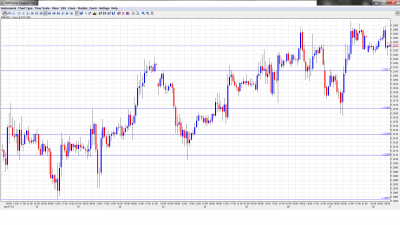Euro dollar took advantage of weak US data, as the pair climbed to the mid-1.32 level. United States GDP for Q1 posted an increase of 2.2%, disappointing the markets which had predicted a 2.5% increase. Last week’s bright spot for the US economy was the UoM Consumer Sentiment release, which posted a slight increase and posted its highest reading in over a year. On the continent, concerns continue over political uncertainty in France and the Netherlands, as well as the budget deficit difficulties in Spain. It’s a busy Monday with five Euro-zone releases and four releases stateside.
Here’s an update on technicals, fundamentals and what’s going on in the markets.
EUR/USD Technicals
- Asian session: EUR/USD rebounded sharply, climbing to 1.3264 and consolidating at 1.3254. The pair has edged downward in the European session, trading at 1.3232.
- Current range: 1.3212 to 1.33.
- Further levels in both directions: Below: 1.3165, 1.3110, 1.3050, 1.30, 1.2945, 1.2873, 1.2760, 1.2660 and 1.2623.
- Above: 1.34, 1.3437, 1.3486, 1.3550 and 1.3615.
- 1.3212 was breached and is now providing weak support.
- 1.33 continues to provide strong resistance.
Euro/Dollar higher after weak US GDP – click on the graph to enlarge.
EUR/USD Fundamentals
- 6:00 German Retail Sales. Exp.+0.8%. Actual +0.8%.
- 8:00 Euro-zone M3 Money Supply. Exp. +2.8%. Actual +3.2%.
- 8:00: Euro-zone Private Loans. Exp. +0.8%. Actual +0.6%.
- 9:00 Euro-zone CPI Flash Estimate. Exp.+2.5%. Actual +2.6%.
- 9:00. Italian Prelim CPI. Exp. +0.3%.
- 12:30 US Core PCE Price Index. Exp. +0.2%.
- 12:30 US Personal Spending. Exp. +0.4%.
- 12:30 US Personal Income. Exp. +0.3%.
- 13:45 US Chicago PMI. Exp. 60.9 points.
For more events later in the week, see the Euro to dollar forecast
EUR/USD Sentiment
- Spanish downgrade could spook markets: Rating agency S&P cut two notches off Spain’s credit rating and set it at BBB+ which means “adequate payment capacity”, at the same level with Italy. According to Fitch and Moody’s, Spain’s rating is higher, at the equivalent of “strong payment capacity”. This will force some institutional managers to sell Spanish bonds, which are already under severe pressure. The markets are worried that the recession in Spain will make it difficult, if not impossible, for the government to tackle its serious deficit problems. Spain has a toxic mix of economic issues, with the high unemployment rate being only one of them. Spain is in a serious crisis. See the Spanish prospects.
- Italy pays higher prices: A fresh auction for 10 year Italian bonds yielded higher yields once again, at 5.84%, higher than the secondary market that prices the bonds at a yield of 5.73% at the time of writing. Higher borrowing costs will only complicate attempts by the government to set its fiscal house in order. Although the situation is not as dire as that of Spain, further instability in the Euro-zone’s third largest economy could spell big trouble for the continent and the euro.
- US economy: strong Q1 but uncertain present: The rise in weekly jobless claims wasn’t a one time event. Figures remain high for 3 consecutive weeks, pushing the moving average above 380K. This weighs on the dollar as it raises the chances for QE3. On the other hand, pending home sales shot up by 4.1%, much better than expected. All in all, Q1 was quite good in the US, but the world’s no. 1 economy is showing signs of slowing down. Another US recession seems unlikely at this point, but the US isn’t the locomotive either. GDP for Q1 disappointed the markets, and the dollar is lower against the euro as a result.
- Fed maintains mixed message: Ben Bernanke didn’t rule out QE3, but as time passes by, this option seems quite unlikely, and even Bill Gross seems to back off his certainty that this move will come. For those lovers of English nuances, the Fed referred to inflation as having “picked up” rather than being “subdued”. Of course, traders are more concerned, and rightly so, with the market reaction to the Fed announcment rather than linguistic acrobatics.
- European recession is serious: Weak spending in France and lower confidence in Germany join the weak PMI data released from the Euro-zone released earlier. The recession seems deeper, and not only restricted to peripheral countries. The official recession in the UK is another ominous sign for the continent.
- Elections in Europe loom: In France, Socialist challenger Francois Hollande will face President Nicholas Sarkozy in the presidential run-off after inconclusive results in the first round. Hollande is not considered pro-market, and the Euro could be affected, at least initially, if Hollande wins the election. Greece will also hold elections on the same day, and the voters face a choice of backing current coalition, austerity supporting parties, or smaller anti-austerity parties. The EU is worried, and rightly so.

